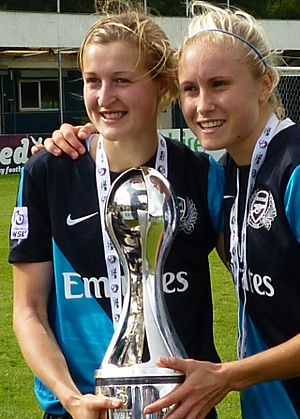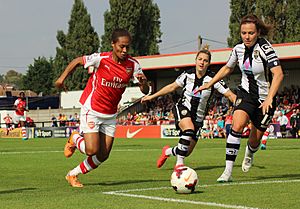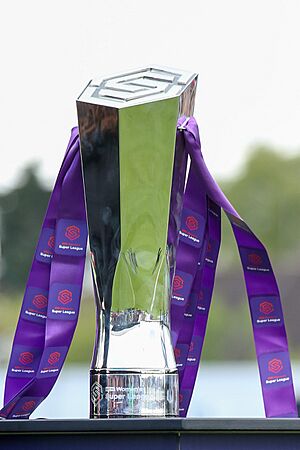Women's Super League facts for kids
 |
|
| Organising body | WSL Football |
|---|---|
| Founded | March 2010 |
| First season | 2011 |
| Country | England |
| Confederation | UEFA |
| Number of teams | 12 |
| Level on pyramid | 1 |
| Relegation to | Women's Super League 2 |
| Domestic cup(s) | Women's FA Cup |
| League cup(s) | Women's League Cup |
| International cup(s) | UEFA Women's Champions League |
| Current champions | Chelsea (8th title) (2024–25) |
| Most championships |
|
| Top goalscorer | Vivianne Miedema (87) |
| TV partners | Sky Sports BBC Sport see broadcasting for international |
The Women's Super League (WSL) is the top professional football league for women in England. It's also known as the Barclays Women's Super League because of its main sponsor. The league was started in 2010 by the Football Association (FA). Now, it is run by WSL Football.
Twelve fully professional teams play in the WSL. It replaced the FA Women's Premier League National Division as the highest level of women's football. The first season in 2011 had eight teams. For the first two seasons, no teams were moved down to a lower league.
From 2011 to 2016, the WSL played during the summer, from March to October. Since the 2017–18 season, it has been a winter league. This means games are played from September to May, like traditional football. From 2014 to 2018, the WSL had two divisions: FA WSL 1 and FA WSL 2. This brought in a system where teams could move up or down between divisions. The second division is now called the Women's Super League 2.
The top three teams in the WSL get to play in the UEFA Women's Champions League the next season. Four clubs have won the WSL title so far: Chelsea (8 times), Arsenal (3 times), Liverpool (2 times), and Manchester City (1 time). Chelsea are the current champions. They won their eighth title in the 2024–25 season, which was also their sixth win in a row.
Contents
History of the WSL
The FA WSL was planned to start in 2010. It was meant to take over from the FA Women's Premier League National Division. However, it was delayed for a year because of a worldwide economic problem. Sixteen clubs applied for the eight spots in the first season. Some of these clubs included Arsenal, Birmingham City, and Chelsea.
The first WSL season began on April 13, 2011. The very first match was between Chelsea and Arsenal. It was played at Chelsea's home ground, Imperial Fields. Chelsea lost the game 1–0.
For the 2014 season, a second division was added. It was called FA WSL 2. Nine teams played in this new division. One team from WSL 1 was moved down to WSL 2. Manchester City joined WSL 1 that year.
In December 2014, the FA WSL announced a plan to make WSL 1 bigger. It would grow from eight to ten teams over two years. Teams from the FA Women's Premier League could also now be promoted to WSL 2. This connected the WSL to the rest of the English women's football system.
In July 2016, the FA announced a big change. The league would switch from a summer league to a winter league. This meant games would be played from September to May, like the men's football calendar. A short "bridging" season, called the FA WSL Spring Series, was played from February to May 2017.
After the 2017–18 FA WSL season, WSL 1 was renamed the FA Women's Super League again. It became a fully professional league for the first time. For the 2018–19 season, there were eleven teams. Clubs had to apply for a new license to be in the league. They had to offer players at least 16-hour-a-week contracts. They also had to create a youth academy.
The league grew to twelve teams for the 2019–20 season. Manchester United and Tottenham Hotspur were promoted to the league. In May 2020, the league season was cut short because of the COVID-19 pandemic. Chelsea were named champions based on their average points per game.
In November 2023, all 24 clubs in the Women's Super League and Women's Championship agreed to form a new group. This group would run the women's professional game in England instead of the FA. It was first called NewCo, then Women's Professional Leagues Limited (WPLL). After the 2024–25 season, it was renamed WSL Football.
It was announced in June 2025 that the WSL will expand to 14 teams. This will happen starting from the 2026–27 season.
How the Competition Works
| Season(s) | Teams |
|---|---|
| 2011–2015 | 8 |
| 2016–2017 | 9 |
| 2017–18 | 10 |
| 2018–19 | 11 |
| 2019–20 onwards | 12 |
The Women's Super League currently has twelve clubs. When it first started, it was called "professional." However, it was actually "semi-professional" for a while. This meant only a few top players were full-time.
The 2011 season had a break in the middle. This was to allow for the 2011 FIFA Women's World Cup. The season then started again in July and finished in August.
All WSL teams also play in a cup competition. This is called the Women's League Cup. In 2014, teams were put into three groups. The winners and best second-place teams went on to a knockout stage. Since the 2015 season, the League Cup has been played at the same time as the league season.
In September 2017, the FA announced changes to the league. The goal was to make the top division fully professional. It would have between 8 and 14 teams. The second division would have up to 12 semi-professional teams. For the 2018–19 season, the league officially became fully professional.
WSL Clubs
The following twelve clubs are playing in the 2025–26 season:
| Team | Location | Main home ground | Capacity | 2024–25 position |
|---|---|---|---|---|
| Arsenal | London (Holloway) | Emirates Stadium | 60,704 | 2nd |
| Aston Villa | Birmingham | Villa Park | 42,640 | 6th |
| Brighton & Hove Albion | Crawley | Broadfield Stadium | 6,134 | 5th |
| Chelsea | London (Kingston upon Thames) | Kingsmeadow | 4,850 | 1st |
| Everton | Liverpool | Goodison Park | 39,414 | 8th |
| Leicester City | Leicester | King Power Stadium | 32,312 | 10th |
| Liverpool | St Helens | Totally Wicked Stadium | 18,000 | 7th |
| London City Lionesses | London (Bromley) | Hayes Lane | 5,000 | WC, 1st |
| Manchester City | Manchester | Academy Stadium | 7,000 | 4th |
| Manchester United | Leigh | Leigh Sports Village | 12,000 | 3rd |
| Tottenham Hotspur | London (Leyton) | Brisbane Road | 9,271 | 11th |
| West Ham United | London (Dagenham) | Victoria Road | 6,078 | 9th |
Players and Finances

In the first WSL season, teams could only have 20 players. This rule was not very popular. So, for the 2012 season, the limit was increased to 23 players. Players from outside the European Union need special permission to play, just like male players.
The FA tried to keep things fair between clubs financially. They had a rule that only four players per team could earn over £20,000. Also, all clubs received £70,000 each season from a special fund. However, some clubs still had much bigger budgets than others. For example, Doncaster Belles lost players to Birmingham City because Birmingham had more money.
Most women's teams that are part of men's clubs get financial support from them. This helps them pay for players and facilities. In the 2022–23 season, 11 out of 12 WSL teams were connected to men's Premier League clubs. This support helps the women's teams grow and become more professional.
WSL Champions
Champions by Season
In the table below, teams in bold won both the WSL and the Women's FA Cup. Teams in bold and italics won the WSL, the Women's FA Cup, and the Women's League Cup.
| Year | Winners | Runners-up | Third place | Top goalscorer | |
|---|---|---|---|---|---|
| Player | Goals | ||||
| 2011 | Arsenal | Birmingham City | Everton | 14 | |
| 2012 | Arsenal | Birmingham City | Everton | 11 | |
| 2013 | Liverpool | Bristol Academy | Arsenal | 13 | |
| 2014 | Liverpool | Chelsea | Birmingham City | 8 | |
| 2015 | Chelsea | Manchester City | Arsenal | 12 | |
| 2016 | Manchester City | Chelsea | Arsenal | 9 | |
| 2017 (Spring Series) | Chelsea | Manchester City | Arsenal | 6 | |
| 2017–18 | Chelsea | Manchester City | Arsenal | 15 | |
| 2018–19 | Arsenal | Manchester City | Chelsea | 22 | |
| 2019–20 | Chelsea | Manchester City | Arsenal | 16 | |
| 2020–21 | Chelsea | Manchester City | Arsenal | 21 | |
| 2021–22 | Chelsea | Arsenal | Manchester City | 20 | |
| 2022–23 | Chelsea | Manchester United | Arsenal | 22 | |
| 2023–24 | Chelsea | Manchester City | Arsenal | 21 | |
| 2024–25 | Chelsea | Arsenal | Manchester United | 12 | |
Champions by Team
| Club | Winners | Runners-up | Years won | Years runners-up |
|---|---|---|---|---|
| Chelsea | 8 | 2 | 2015, 2017–18, 2019–20, 2020–21, 2021–22, 2022–23, 2023–24, 2024–25 | 2014, 2016 |
| Arsenal | 3 | 2 | 2011, 2012, 2018–19 | 2021–22, 2024–25 |
| Liverpool | 2 | 0 | 2013, 2014 | |
| Manchester City | 1 | 6 | 2016 | 2015, 2017–18, 2018–19, 2019–20, 2020–21, 2023–24 |
| Birmingham City | 0 | 2 | 2011, 2012 | |
| Bristol Academy | 0 | 1 | 2013 | |
| Manchester United | 0 | 1 | 2022–23 |
WSL Hall of Fame
In September 2021, the Women's Super League started its own Hall of Fame. This honors important people who have helped women's football grow in England and the WSL.
Broadcasting WSL Matches
You can watch WSL matches in the United Kingdom and Ireland on The FA Player, Sky Sports, and BBC Sport. Many matches are also shown in other countries around the world.
Watching in the UK and Ireland
Early WSL games were shown on ESPN from 2009 to 2013. Later, BBC Two also showed some games. During the 2017–18 season, many WSL games were on BT Sport. The BBC also showed games online and on their red-button service. The league's Facebook page also streamed matches.
Since the 2019–20 season, most league matches have been streamed for free on The FA Player. This service also shows some Women's Championship games and highlights from cup competitions.
In March 2021, the FA WSL made a new TV deal with Sky Sports and BBC. This deal started with the 2021–22 season. Sky broadcasts 44 matches each season. The BBC shows 22 matches, with at least 18 on BBC One or Two. All other games are still free to stream on The FA Player. This was the biggest TV deal for any professional women's football league in the world at the time.
In July 2024, YouTube became a new place to stream non-broadcast WSL matches. Sky Sports and the BBC continued to show games for the 2024–25 season. In October 2024, a new five-year deal was agreed with Sky Sports and the BBC. This deal is worth £65 million. Sky Sports will show 118 live matches per season. The BBC will show 21 matches, and the rest will be on YouTube.
Watching Internationally
For countries that do not have a specific TV deal, all WSL matches are available to watch on YouTube.
| Country | Broadcaster |
|---|---|
| Optus Sport | |
| Africa | SuperSport |
| Sky Sport | |
| W-Sport | |
| Southeast Asia | |
| Sportsnet | |
| Caribbean | ESPN |
| South America | |
| Central America | Sky Sports |
| O2 TV Sport | |
| Viaplay | |
See also
 In Spanish: Women's Super League para niños
In Spanish: Women's Super League para niños
- Women's Super League records and statistics
- List of Women's Super League clubs



